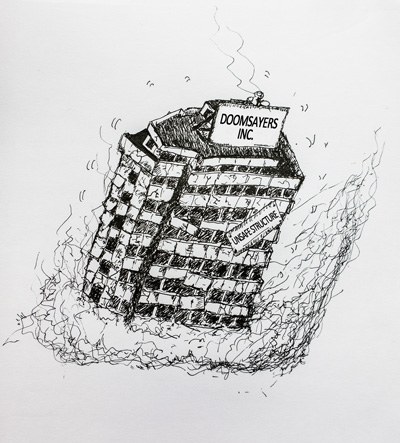|
 |
|
(ERIC DALY) |
If there is a Chinese miracle to speak of, it is the integration of the world's most populous nation into the international community
The widely discredited—but surprisingly durable—rhetoric of "China collapse" has recently once more reared its head. Fourteen years after American author Gordon Chang predicted the downfall of the Chinese Government by 2011, U.S. scholar David Shambaugh sounded the alarm again in early March. Shambaugh asserted that the time has come to give his verdict on a "protracted, messy and violent" regime change in China.
While he handpicked a few phenomena to justify his end-of-the-world claims, often twisting them through misinterpretation and speculation, Shambaugh failed to look at how ordinary Chinese on the ground feel about their country and society.
For instance, Shambaugh cited the emigration of Chinese millionaires as a "telling sign of lack of confidence" in the government. Although economic migration may correlate with political instability, it happens all the time, especially in high corporate tax countries such as the United States. There have been numerous reports about the spike in the number of people renouncing U.S. citizenship in recent years, which hit a record high of more than 3,400 last year, as opposed to several hundred a decade ago. It is therefore ill-advised to establish a positive correlation between the exodus of the wealthy and the imminent collapse of a country.
Indeed, China's development has always been an enigma to Western observers, with some calling it a miracle, and others constantly voicing caution. But for the Chinese, now is a time of long-dreamed-of peace, growth and openness.
China has traveled a winding path to modernity. When the Peace of Westphalia, which ended decades of wars in Europe and laid the groundwork for a modern system of international relations, was signed in 1648, the newly established Qing Dynasty of China (1644-1911) was busy consolidating its rule. With their infamous closed-door policy, the Qing rulers tended to isolate themselves from the rest of the world. That was partly why China responded awkwardly to clashes with Western powers over issues such as trade and the protection of expats from 1840 onward. These colonial powers, well versed in modern diplomacy and technology, compelled the Qing regime to open its doors through a series of military offensives. This forced opening up led to the compromise of China's sovereign rights and the fragmentation of Chinese society. Even after the Qing Dynasty was overthrown in 1911, China remained in a shambles. More turbulence, resulting from infighting and Japanese invasion, ensued. So when the People's Republic of China was founded in 1949, hopes were high that the Communist Party of China (CPC) would steer the country toward stability and prosperity.
However, it took the CPC another three decades to find the right path. After engaging in costly social experimentation during which its policies vacillated from a focus on economic reconstruction in the early days of the People's Republic to political radicalism during the "cultural revolution" (1966-76), the CPC came to recognize the inexorable trend of globalization. Only by taking the initiative in embracing the world and keeping abreast of its latest developments could China rid itself of its backwardness. In 1978, a crucial decision was made to initiate a process of reform and opening up. Under this policy, China entered the fast track to economic and social progress.
Needless to say, this opening-up process, which has proceeded in a well-managed and incremental fashion, has delivered benefits to the nation. It is a common belief among Chinese, from all walks of life, that this process should continue. China, a latecomer in the worldwide drive toward modernization, cannot afford more disruptions.
It should also be noted that the opening-up process has transformed China from a marginalized state into a stakeholder in the international system. If there is a Chinese miracle to speak of, it is the integration of the world's most populous nation into the international community.
Of course, China confronts a host of troubles, ranging from corruption of government officials to environmental degradation. These problems cannot be solved overnight or in one fell swoop. As it tackles challenges, critical comments from China watchers are always welcome. Constructive suggestions based on sound judgment and the experience of Western countries, which have a much longer history of industrialization, can be of much help. Doomsayers, however, may do more harm than good.
Copyedited by Eric Daly
Comments to yanwei@bjreview.com | 